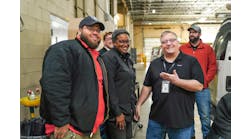In the 2015 movie The Intern, Robert DeNiro starred as a 70-year-old widower who returns to the workforce as an under-appreciated and seemingly out-of-step intern working for a young boss played by Anne Hathaway.
Initially, Hathaway’s character can’t quite relate to this Baby Boomer who ditched retirement out of boredom, but by the film’s finale she comes to appreciate his skills and experience.
In real life you’re unlikely to encounter many septuagenarian interns, but it’s not unusual for people to re-enter the labor market or launch new careers when they are well into what was once considered retirement age.
And that can be good for businesses that are willing to take advantage of all those decades of hard-earned experience.
Starting a new career after 60 is not for everyone. But it can be rewarding for those with energy and commitment levels that are high, and who are willing to learn new skills and keep up with the constantly evolving technology.
The question is whether businesses will balk at hiring workers who, in many cases, are old enough to be the parents of the people supervising them. Sure, there are downsides, but the upsides can be tremendous when it’s the right fit for the right person.
InvisiLight® Solution for Deploying Fiber
April 2, 2022Go to Market Faster. Speed up Network Deployment
April 2, 2022Episode 10: Fiber Optic Closure Specs Explained…
April 1, 2022Food for Thought from Our 2022 ICT Visionaries
April 1, 2022A few things businesses should keep in mind as they weigh whether to hire older workers include:
Experience counts. Baby Boomers come to the table with a whole set of experiences, including 30 or 40 years of interpersonal people skills that make them more adept at dealing with unique situations or different types of people. On the flip side, some of them could lack the technical skills that we take for granted in today’s workforce. So, be careful what you are asking them to do.
Self-motivation. The odds are older employees will be self-motivated. If these potential workers would like to join an organization or start a new career after 60, they probably like the idea of work. They need to do something every day. Perhaps they view their job as intellectually stimulating. You do need to make sure of their motivation, though, he says. If they’re just working for a paycheck, that might not cut it.
Different age groups have their own behaviors. Baby Boomers often have a very different set of values than millennials. Different things motivate them. The culture of an organization is very important and can be tricky. You want to make sure these older workers have an opportunity to thrive in your new environment. While it’s best to avoid stereotyping the generations too much, in general Baby Boomers tend to be productive, loyal to the company, willing to put in long hours to get the job done, and prefer to have conversations in person.
Companies that pass on hiring older workers risk missing out on people who could become some of their most valuable employees. Age shouldn’t be the issue. Instead, as with any hire, the issue is what skills and experiences each of these people can bring to the workforce.
About the Author: Andi Simon, author of On the Brink: A Fresh Lens to Take Your Business to New Heights, is a corporate anthropologist, award-winning author, and trained practitioner in Blue Ocean Strategy®. She is the founder and CEO of Simon Associates Management Consultants, designed over a decade ago to help companies use the tools of anthropology to better adapt to changing times. Simon has appeared on "Good Morning America" and has been featured in the Washington Post, Business Week and Forbes, and on Bloomberg Radio. For more information, please visit https://www.simonassociates.net.








